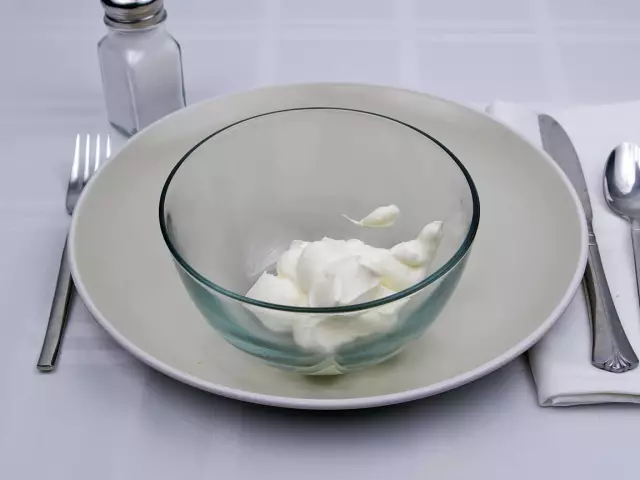- Author Rachel Wainwright [email protected].
- Public 2023-12-15 07:39.
- Last modified 2025-11-02 20:14.
Daikon
Daikon is a root vegetable that is a subspecies of radish. This root crop was bred by the Japanese in ancient times from a wild plant originating from East Asia. Nowadays, daikon is grown not only in Asia, but now in Europe, and even in Russia.
The ratio of BJU in the product

Source: depositphotos.com How to burn 18 kcal?
| Walking | 5 minutes. |
| Jogging | 2 minutes. |
| Swimming | 2 minutes. |
| A bike | 3 min. |
| Aerobics | 4 minutes |
| Household chores | 6 minutes |
In translation from Japanese, "daikon" is translated as "big root". We also call this plant white radish or sweet (Japanese, Chinese) radish.
Daikon radish can grow over 60 cm in length, and the weight of one root crop can reach 500 grams or more.
Useful properties of daikon
The main valuable properties of daikon radish are its low calorie content and high content of vitamins and nutrients. Unlike traditional radish, daikon does not contain mustard oil. In addition, the aroma of daikon is not as sharp as that of a regular radish. Daikon tastes tender, juicy and crunchy. In Japan, the population uses the daikon radish for food every day, the area under root crops in this country occupies the first place.
The calorie content of daikon is very low: 100 grams of the product contains 21 kilocalories. Due to its low calorie content, daikon can be included in the diet for those who want to lose weight.
So, daikon radish contains the following beneficial substances:
- Vitamin C;
- Vitamin B (B1, B2, B7, B9);
- Fructose;
- Cellulose;
- Potassium;
- Calcium;
- Sodium;
- Copper;
- Magnesium;
- Selenium;
- Iodine;
- Chromium;
- Iron;
- Phosphorus;
- Pectin;
- Phytoncides;
- Enzymes (myrosinase, amylase and esterase).
Only 100 grams of daikon radish provide a person with 34% of the daily need for vitamin C. The enzyme myrosinase actively promotes better digestion, and fiber - cleansing the intestines from toxins, toxins and fecal accumulations. The enzymes amylase and esterase have an important effect on the normal functioning of metabolism, these enzymes are compounds that are most similar to their natural counterparts (substances that make up the human body). It is thanks to these substances that fats, carbohydrates and proteins from food are better absorbed.
A distinctive feature of daikon is that this vegetable contains a lot of protein, but does not contain fat. The active enzyme in daikon helps to normalize the digestion of starchy foods. The presence of phytoncides protects the body from the development of viral and microbial diseases, since viruses and microbes are destroyed under the influence of these substances. Thus, an important beneficial property of daikon is the strengthening of the body's defenses. Potassium salts remove excess fluid from the body.
Traditional medicine has long been using the nutritional value and healing properties of daikon to treat people and improve their health.
And now let's combine the useful properties of daikon into the list, that is, everything that exactly this product can help the body with:
1. Improves appetite;
2. Promotes digestion;
3. Improves liver function;
4. Improves kidney function;
5. Helps to remove excess water;
6. Heals wounds;
7. Provides the prevention of viral diseases;
9. Strengthens the immune system;
10. Fights infectious diseases;
11. Prevents the development of cancer.
Application of daikon radish
The beneficial properties of daikon radish are used for the following health problems:
- Overweight (obesity of all degrees);
- Diabetes;
- Oncology;
- Colds (ARVI, flu);
- Atherosclerosis;
- Rheumatism;
- Liver disease;
- Renal failure;
- Gallstones;
- Bowel disorders;
- Gastric disorders;
- Cardiovascular diseases.
Very often, daikon is included in both weight loss diets and when organizing a healthy diet. Effectively carrying out fasting days using this root crop. Along with the low-calorie daikon, fructose is the main sugar in it (it gives the sweet taste), making this product ideal for diabetics. With regular consumption of daikon in food, it is possible to cleanse the blood vessels from cholesterol plaques, as a result of which they acquire elasticity.
It is useful to use daikon for those who have been exposed to radioactive irradiation, since the active substances of the plant are capable of removing radionuclides from the body. The antiseptic and bactericidal properties of daikon allow the product to be used as an excellent prophylactic agent against colds and various infectious diseases.
Strengthening the immune system is achieved, among other things, due to the high content of vitamins in daikon radish. The consumption of daikon radish has a beneficial effect on the functioning of almost every organ: it stimulates the stomach and intestines, kidneys and liver. A very important quality is that daikon has anticarcinogenic properties, that is, it prevents the development of oncological diseases. Severe chronic diseases associated with metabolic disorders in the body are more successfully treatable when eating this product.
Due to the high content of antioxidants in daikon radish, this product is one of the best ways to fight cardiovascular diseases and atherosclerosis, and can be considered an anti-aging agent.
Our daikon radish is not yet as popular as in Asia. However, Chinese and Japanese restaurants always include daikon radish on the menu. Exotic lovers can also try this wonderful vegetable and cook it at home.
The Japanese and Chinese eat daikon almost every day, as we, for example, potatoes. Daikon is used by them as a side dish for salads, meat, sushi, and fried fish. Daikon radish is used to prepare salads with the addition of vegetable oil, sour cream or cream. The famous miso soup is made from daikon.

There are also various recipes for harvesting (canning) daikon radish (pickling, drying, salting). A very unusual Japanese recipe is daikon stew with octopus or squid.
In addition to the daikon radish tuber itself, fresh leaves of the plant can also be eaten. They are used for side dishes, salads and as an ingredient for sushi.
It is remarkable that over time, the beneficial properties of daikon become known in our country, thanks to which this vegetable has become the favorites of many gourmets and connoisseurs of healthy food.
Contraindications
Despite the many useful properties of daikon, there are a number of contraindications to its use in food. Excessive consumption of this product can cause flatulence and irritation of the mucous membranes of the digestive tract. In this regard, daikon is not recommended for frequent use by people with health problems such as:
- Stomach ulcer;
- Duodenal ulcer;
- Gastritis;
- Gout.
In the presence of chronic diseases of the kidneys, liver, impaired metabolism, before starting to use daikon, you should consult your doctor.
YouTube video related to the article:
Found a mistake in the text? Select it and press Ctrl + Enter.






